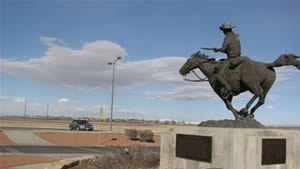New Mexico Commentary
The Duality of the Buffalo Soldier
Routed in the DNA of my consciousness are the centuries of African American struggle living in the Diaspora, outside the continent of Africa, and yet, after several hundred years of crimes against humanity through murder, exploitation, dehumanization, and abject poverty, the United States is still lock in the vault of denial.
Is there truly a way to right the wrong? Will any form of compensation every due justice? Some would even question the merit of such a thought even though many others have received forms of reparations. So then, what do the descendents of African Americans who had suffered so much injustice deserve?
As I rode closer toward the deserts of the South West and people learned of my travels and mission, momentum began to swell for the acknowledgement of the contributions of the Buffalo Soldier to the advancement of the western frontier. Overwhelmingly, they embraced the legacy of the regiment organized on the 21st of September in 1866 in New Orleans, Louisiana, and initially commanded by Colonel Edward Hatch. The regiment's motto was, and remains, "We Can, We Will". 
The first task of the regiment was to maintain law and order in Texas. At the Battle of Beecher Island in 1868, the regiment defeated a combined force of Arapaho, Northern Cheyenne, Brule, and Oglala Sioux Indians. The regiment went to New Mexico Military District, which covered parts of New Mexico, Colorado and Texas, and participated in the Apache Wars from 1875 to 1881. That service included the Battle of Tularosa with Chiricahua Apache warriors led by Victorio in May 1880.
Eighteen African Americans earned the Medal of Honor during the Indian Wars in the western United States. Fourteen were "Buffalo Soldiers", members of the Army's first peacetime black regiments. The four Buffalo Soldier regiments, the 9th Cavalry, 10th Cavalry, 24th Infantry, and25th Infantry, fought in campaigns throughout the west. The remaining four Medal of Honor recipients were U.S. Army Indian Scouts recruited from among the Black Seminoles, a group of Indigenous florida people of African descent.
Many of those who enlisted had served in volunteer units during the Civil War or were emancipated slaves from southern states. In fact, some of the first recruits were Civil War veterans. Veterans, whose service in the military allowed them to demonstrate not only their skills and bravery but their desire to become, despite the many injustices inflicted upon generation after generation, part of the fabric of a growing nation.
It is widely accepted that the Indigenous people of Turtle Island, while some claiming to have had slaves themselves, gave shelter and comfort to thousands of African men and women, who for nearly two hundred years, escaped from slavery. In the story of the seminoles it tells of the battle between the military and seminoles because of the capture of a Black seminole woman who was married to the leader of the nation.
Chronicling commonalities of the Indiginous and African people is found in the work of Dr. Ivan Van-Sertima’s entitled “They came before Columbus” then continued into the period of enslavement as Co-conspiritors in the fight and flight for freedom throughout the Military campaign to erradicate their populations and even to this day on the reservations of the southwest and the inner-cities of Newark, Los Angeles, and others.
Certainly the United States is in denial and wants to put the ugly side of “race” relations behind us and so it should. However, no disagreement, injustice, or blood spilled is ever resolved without a conversation and acknowledgement of the wrong done by the perpetrator or his/her beneficiary to the one(s) who suffered. The measure of an individual or a country is scaled on his ability to offer, if nothing more, an apology.
The government owes African Americans an apology and perhaps African Americans owe the same to Native peoples. If this is the case, then who shall take the first step toward reconciliation?